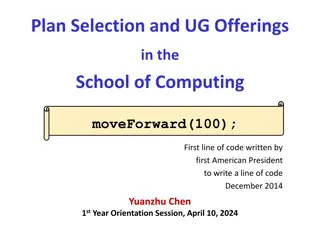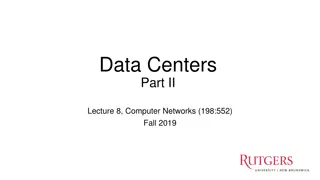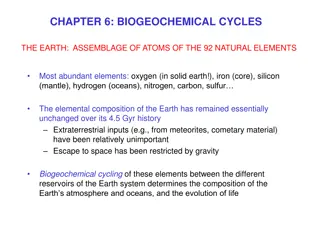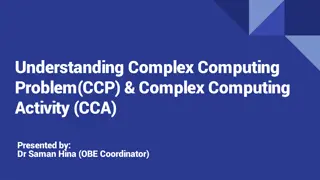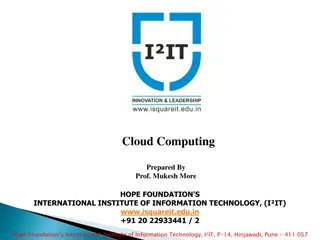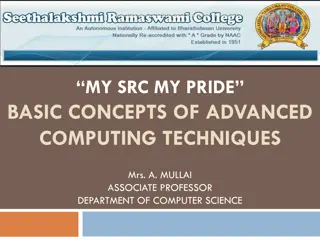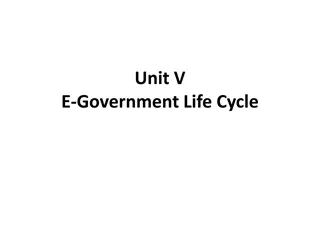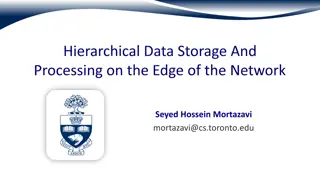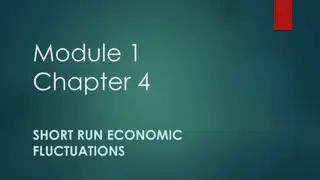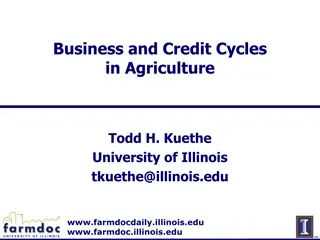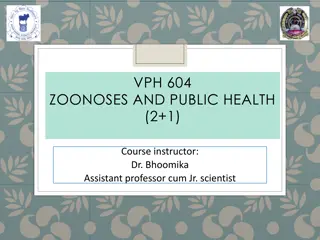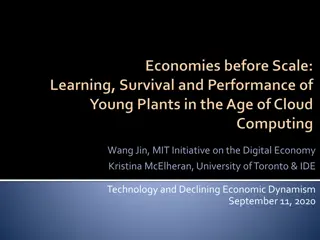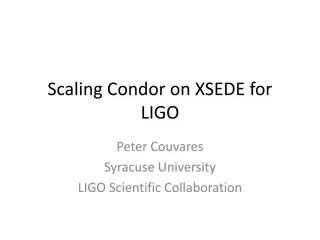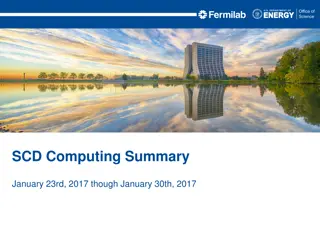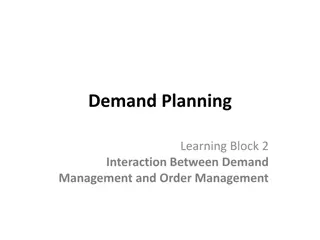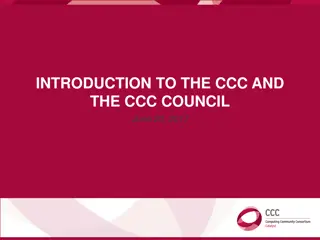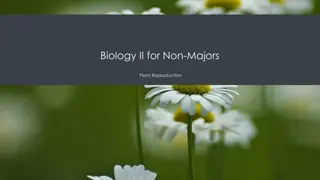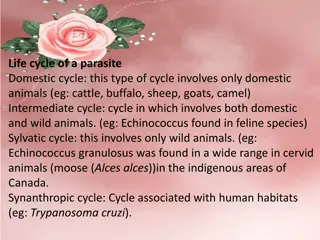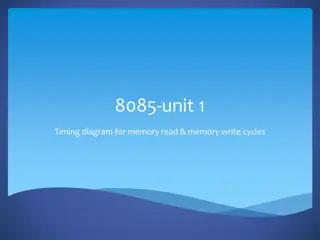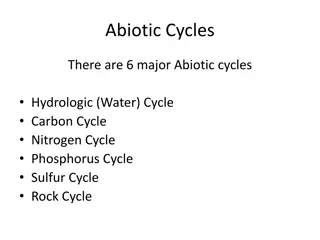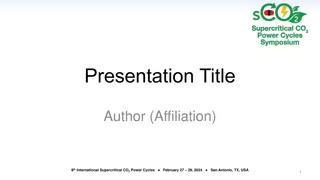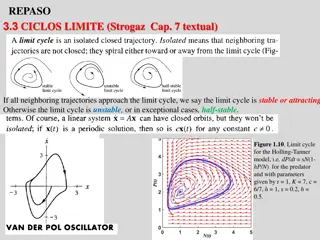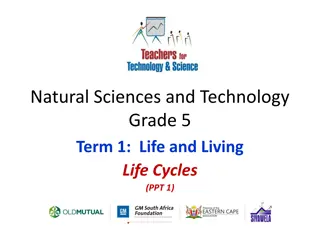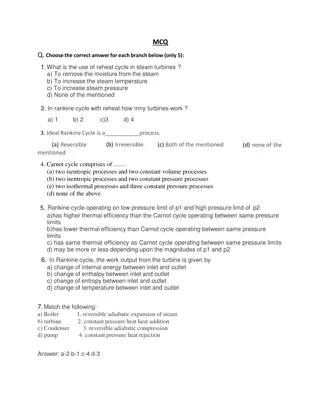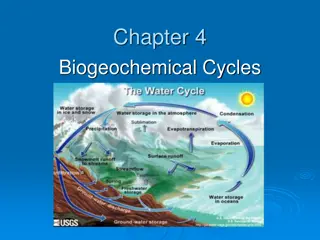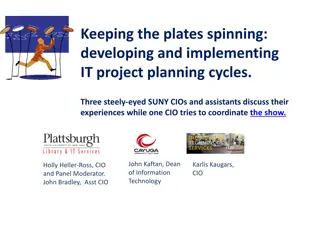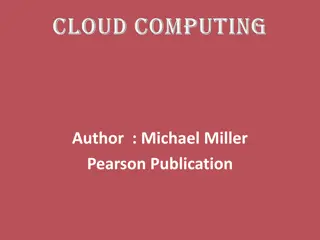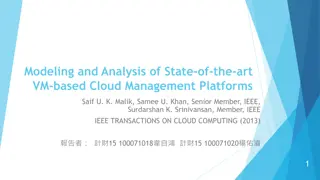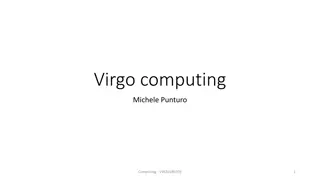Computing Degree Plans and Offerings at School of Computing
Explore the diverse degree plans and offerings at the School of Computing, including Honours and General degrees, minors, and certificates in Data Analytics. Plan selection is crucial for advancing to second-year courses, with automatic acceptance and pending list options available. Discover the var
0 views • 20 slides
Understanding Data Centers and Cloud Computing Technologies
Explore the world of data centers and cloud computing through topics such as data center functionalities, cloud computing advantages, challenges in Data-Center Networks (DCNs), cost breakdowns, server utilization considerations, and more. Delve into the intricacies of managing large-scale computing
0 views • 20 slides
Insights into Biogeochemical Cycles and Evolutionary History of Earth
The Earth's elemental composition has remained constant over its 4.5 billion-year history, with biogeochemical cycles playing a vital role in shaping the atmosphere and oceans. The evolution of oxygen, ozone, and life on Earth is intricately linked to these cycles. Contrasting Earth and Venus, it's
0 views • 15 slides
Understanding Parallel and Distributed Computing Systems
In parallel computing, processing elements collaborate to solve problems, while distributed systems appear as a single coherent system to users, made up of independent computers. Contemporary computing systems like mobile devices, IoT devices, and high-end gaming computers incorporate parallel and d
1 views • 11 slides
Understanding Complex Computing Problem (CCP) and Complex Computing Activity (CCA)
Dr. Saman Hina, along with Dr. Farrukh Arif and Dr. Maria Waqas, presents information on Complex Computing Problem (CCP) - a problem involving technical, computing, and other issues with no obvious solution, requiring deep knowledge and analytical thinking. CCP is evaluated through predefined rubric
4 views • 19 slides
Understanding Cloud Computing and Its Components
Cloud computing, offered by the Hope Foundation's International Institute of Information Technology, is Internet-based computing that involves remote servers sharing data-processing tasks and resources. Users can access software without local hardware requirements, empowering them with agility and e
0 views • 15 slides
Exploring Basic Concepts of Advanced Computing Techniques
Delve into the world of advanced computing techniques with Mrs. A. Mullai as she discusses networks, computing, and pervasive (ubiquitous) computing. Discover how networks facilitate data exchange, the role of computing in designing hardware and software systems, and the trend of embedding computati
2 views • 40 slides
Contrasting E-Government and General Project Life Cycles
E-Government project life cycles differ significantly from general project life cycles, with the former's focus on management and stakeholder needs, leading to challenges in requirements gathering and adapting to changing priorities. The Waterfall model used in general projects may result in project
0 views • 9 slides
Exploring Emerging Technologies in Cloud Computing
Cloud computing revolutionizes accessibility to computing resources through shared pools. Next-generation applications, edge computing, and web applications on the cloud are shaping the future. CloudPath offers a platform for executing third-party applications across distributed data centers. Real-w
0 views • 16 slides
Understanding Cloud Computing, Edge Computing, and Their Applications
Cloud computing entails centralized processing of data on powerful servers, offering scalable resources over the internet. Edge computing brings processing closer to data generation points, reducing latency and enhancing security. Both paradigms cater to different needs such as IoT, autonomous vehic
0 views • 18 slides
Understanding Trade Cycles: Economic Fluctuations and Phases
Trade cycles, also known as business cycles, are fluctuations in economic activities, affecting employment, output, income, prices, and profits. These cycles consist of phases including depression, recovery, prosperity, and recession. During booms, economic activities peak, while recessions see a sl
7 views • 7 slides
Exploring Pseudo-Goodwin Cycles in a Minsky Model
This paper delves into the dynamics of Pseudo-Goodwin cycles within a Minsky model, examining the counter-clockwise movement of output and wage share. It distinguishes between true Goodwin cycles and pseudo variants, highlighting the role of income distribution, debt, and demand in shaping economic
0 views • 27 slides
Understanding Business and Credit Cycles in Agriculture
This research delves into the relationship between business and credit cycles in agriculture, focusing on the impact on operating margins, farmland prices, and lending practices. It explores the linkage between asset values and credit, highlighting the significance of farmland as collateral in farm
0 views • 23 slides
Understanding Zoonoses in Public Health: Classification and Transmission Cycles
Zoonoses, diseases transmitted from animals to humans, are classified based on etiological agents, transmission cycles, and reservoir hosts. The classification includes bacterial, viral, rickettsial, chlamydial, mycotic, and parasitic zoonoses. Transmission cycles are categorized as direct, cyclozoo
0 views • 19 slides
Exploring Orto-Computing: Bridging the Gap Between Formal and Phenomenological Computing
Meaningful experiments suggest a transition from the formal, Turing-based approach to a structural-phenomenological one called Orto-Computing. This innovative concept integrates mind-matter interaction and non-formal functions within computational systems, offering potential solutions to complexity
0 views • 18 slides
Exploring the World of E-Cycles: Innovation, History, and Legal Aspects
Delve into the realm of E-Cycles through an informative journey covering the North East Electric Conclave, advancements in e-mobility, and the legal framework for E-Cycles in India. Uncover the fascinating history of E-Cycles, from their inception in the 1890s to their modern-day classifications and
3 views • 23 slides
Impact of Cloud Computing Technology on Young Firms' Performance
The technology shock of cloud computing has significantly influenced the survival and performance of young firms. Young firms face higher uncertainty, benefit from experimentation, and are resource-constrained, making cloud computing's elastic, fast, and generic nature particularly advantageous. Thi
0 views • 21 slides
Scaling Condor on XSEDE for LIGO - Collaborative Computing Project
The project aims to evaluate the utilization of XSEDE resources by LIGO for large-scale computing tasks, with a focus on distributed computing challenges and fostering a research computing community. Various aspects such as political, cultural, and technical narratives surrounding the collaboration
0 views • 28 slides
Summary of SCD Computing Metrics and Scientific Computing for January 23rd - January 30th, 2017
This summary covers a range of topics related to scientific computing metrics and SCD computing services from January 23rd to January 30th, 2017. It includes details on service areas, offerings, job operations, resource provisioning, database management, system monitoring, and more. The summary also
0 views • 5 slides
Demand Planning and Order Management: Enhancing Efficiency
Explore the intricate relationship between demand planning and order management, crucial for optimizing customer order fulfillment cycles. Learn key principles, tools, and techniques to enhance communication and manage demand effectively, along with contemporary approaches and e-commerce fulfillment
1 views • 28 slides
Overview of the Computing Community Consortium
The Computing Community Consortium (CCC) was established in 2006 under the Computing Research Association (CRA) to develop a vision for computing research and communicate it to stakeholders. It aims to align computing research with national priorities, encourage high-impact research, and groom new l
0 views • 48 slides
Plant Reproduction and Life Cycles in Biology II for Non-Majors
Explore the complex processes of plant reproduction, life cycles, and the alternation of generations in biology. From the fusion of male and female gametes to the development of sporophytes and gametophytes, delve into the stages and structures involved in the reproduction of gymnosperms and angiosp
0 views • 25 slides
Introduction to Mobile Computing Principles and Designing Mobile Applications
Mobile computing systems involve computing capabilities that can be utilized while on the move, leveraging wireless connectivity, small size, and mobile-specific functionalities. The history of mobile computing traces back to military origins and has evolved with technologies like GPS and wireless t
0 views • 98 slides
Introduction to Boston University's Shared Computing Cluster
Boston University's Shared Computing Cluster (SCC) provides researchers with access to a high-performance computing environment for running code, collaborating on shared data, and utilizing specialized software packages. With over 800 nodes, 20,000 processors, and hundreds of GPUs, the SCC offers re
0 views • 63 slides
Understanding the Complexities of Parasite Life Cycles and Host Interactions
Parasites exhibit diverse life cycles and behaviors, with cycles ranging from domestic to sylvatic environments. Factors influencing parasite diseases include host specificity, immunity, and host-parasite interactions. Parasitism can alter host behavior, impacting ecological dynamics. Immunology pla
0 views • 9 slides
Overview of Task Computing in Parallel and Distributed Systems
Task computing in parallel and distributed systems involves organizing applications into a collection of tasks that can be executed in a remote environment. Tasks are individual units of code that produce output files and may require input files for execution. Middleware operations coordinate task e
0 views • 17 slides
Understanding Processor Cycles and Machine Cycles in 8085 Microprocessor
Processor cycles in microprocessors like 8085 involve executing instructions through machine cycles that are essential operations performed by the processor. In the 8085 microprocessor, there are seven basic machine cycles, each serving a specific purpose such as fetching opcodes, reading from memor
0 views • 17 slides
Understanding Abiotic Cycles in Ecosystems: Hydrologic, Carbon, Nitrogen, and More
Abiotic cycles play a crucial role in regulating ecosystems. The hydrologic cycle involves processes like evaporation, condensation, precipitation, and transpiration. The carbon cycle relies on photosynthesis, respiration, and human activities like deforestation and burning fossil fuels. The nitroge
0 views • 20 slides
8th International Supercritical CO2 Power Cycles Conference in San Antonio, TX, USA
The 8th International Supercritical CO2 Power Cycles Conference is scheduled from February 27-29, 2024, in San Antonio, Texas, USA. This conference aims to bring together experts in the field to discuss the latest advancements and research in supercritical CO2 power cycles. The event will feature pr
0 views • 9 slides
SMC Alliance Annual Meeting: Defeating Malaria Together - Overview and Planning for 2022
The SMC Alliance Annual Meeting discussed the methodology for data collection and analysis, past SMC campaign data, coverage and trends in average number of children covered since 2014. It highlighted countries performing 5 cycles, those with incomplete 4th cycles, and those focusing on 3 cycles. Th
0 views • 8 slides
Understanding Limit Cycles and Bifurcations in Dynamical Systems
Explore the stability of limit cycles and bifurcations in dynamical systems through examples like the Holling-Tanner model. Discover the significance of stable limit cycles and the role of Liapunov functions in forbidding closed orbits. Delve into the intriguing behavior of trajectories in bottlenec
0 views • 16 slides
Understanding Life Cycles: Plants and Animals
Explore the fascinating world of life cycles in plants and animals through engaging visuals and descriptions. From the process of germination to the different stages of growth and development, discover how living organisms move through their life cycles. Topics include plant pollination, seed disper
0 views • 14 slides
Engineering Thermodynamics Multiple Choice Questions
This content covers various topics related to engineering thermodynamics through multiple-choice questions. It includes concepts such as the use of reheat cycles in steam turbines, ideal Rankine cycles, Carnot cycles, and the efficiency of different cycles. Questions on the Rankine cycle, working fl
0 views • 4 slides
Animal Life Cycles Review and Group Challenge
Explore the world of animal life cycles through a trivia game and group challenge. Test your knowledge on organisms, embryos, vertebrates, invertebrates, and more. Dive into rounds of tricky taboo questions and identify adult animals from their offspring. Discover common traits among mammals, unders
0 views • 8 slides
Understanding Biogeochemical Cycles and Their Impact on Earth's Ecosystems
Biogeochemical cycles involve the cycling of essential nutrients like water, carbon, oxygen, nitrogen, phosphorus, and sulfur through abiotic components like water, air, soil, and rock to biotic components like plants, animals, fungi, and bacteria. Humans play a significant role in these cycles, imp
0 views • 24 slides
Thermodynamic Calculators for Comprehensive Analysis of Systems, Processes, and Cycles
Explore a series of simplification in the TESTcalc Tree, leading to the accurate analysis tool system states and basic tools for uniform and non-uniform systems. Access TESTapps for a variety of thermodynamic calculators catering to specific, generic, mixing, non-mixing, and combustion systems, alon
0 views • 12 slides
Keeping the Plates Spinning: Insights from SUNY CIOs on IT Project Planning Cycles
Three SUNY CIOs and their assistants share experiences on IT project planning cycles, emphasizing the crucial role of planning for success. Lack of planning can lead to chaos and inefficiencies. The discussion highlights the need for strategic IT enablement in the academic enterprise and the importa
0 views • 35 slides
Introduction to Cloud Computing: A Comprehensive Overview
Cloud computing, a transformative technology, enables easy access to applications and data from anywhere in the world, promoting collaboration and efficiency. This chapter delves into the fundamentals of cloud computing, distinguishing it from traditional desktop computing and network computing. Und
0 views • 32 slides
State-of-the-art Analysis of VM-based Cloud Management Platforms
This study delves into the modeling and analysis of cutting-edge VM-based cloud management platforms, exploring topics such as cloud computing, cloud structure, types of cloud computing, key features of cloud computing, and examples from the cloud computing industry. It discusses Infrastructure as a
0 views • 40 slides
Overview of Virgo Computing Activities
Virgo computing has been a hot topic recently, with various discussions and meetings focusing on computing issues, future developments in astroparticle computing, and funding for INFN experiments. The activities include presentations, committee meetings, talks, and challenges in computing faced by V
0 views • 34 slides
